Choosing the Right Seed Mixes for Pet Birds
- Saifur Rahman
- Jul 30, 2024
- 11 min read
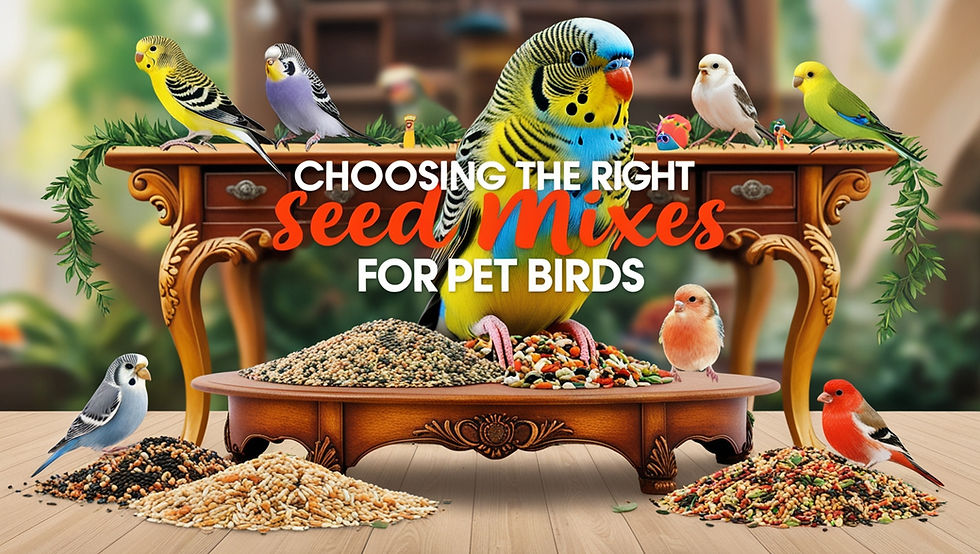
Key Takeaways
Key Points | Description | Implications |
Nutritional Needs | Essential nutrients required for pet birds and how seed mixes fulfill these needs. | Ensuring balanced nutrition to prevent deficiencies and promote overall health. |
Seed Types | Common types of seeds used in bird mixes and their benefits. | Understanding which seeds are beneficial or harmful for specific bird species. |
Bird Species | Dietary needs of different bird species and recommended seed mixes. | Tailoring seed mixes to meet the specific needs of different bird species. |
Seed Quality | Factors determining seed quality and how to identify high-quality seeds. | Choosing high-quality seeds to avoid health risks and ensure proper nutrition. |
Commercial Seed Mixes | Advantages, brand comparisons, and label considerations of commercial seed mixes. | Selecting the best commercial seed mix for your pet bird. |
Homemade Seed Mixes | Creating, benefits, ingredients, and nutritional balance of homemade seed mixes. | Making informed decisions about homemade seed mixes to ensure they meet nutritional needs. |
Seasonal Variations | Changes in dietary needs with seasons and recommended seed mixes for different times of the year. | Adjusting seed mixes to meet seasonal dietary requirements of pet birds. |
Seed Mix Additives | Common additives, their benefits, harmful additives, and probiotics in seed mixes. | Understanding the role of additives in enhancing bird health and avoiding harmful substances. |
Organic vs. Non-Organic Seeds | Benefits, differences, risks, and verification of organic seeds. | Choosing organic seeds for safer and healthier nutrition. |
Special Diets | Considerations for health issues, older birds, allergies, and overweight birds. | Customizing seed mixes to address specific dietary needs and health conditions. |
Supplementary Foods | Supplementary foods, their benefits, and feeding frequency. | Enhancing nutrition with supplementary foods and avoiding harmful items. |
Feeding Habits | Establishing healthy feeding habits, signs of over/underfeeding, and feeding environment. | Promoting healthy feeding behaviors and maintaining optimal nutrition. |
Introduction
Did you know that providing the right seed mix can improve your bird’s health by over 50%? Choosing the right seed mixes for pet birds is essential to keep them happy and healthy. Birds need a variety of nutrients to thrive, just like we do. This guide will help you understand the best options for your feathered friends.
By learning about the different types of seeds, the specific needs of various bird species, and the benefits of organic seeds, you can make informed decisions. We will also discuss how to create homemade seed mixes and the importance of seasonal variations in your bird's diet.
Let’s dive into the world of seed mixes and discover how you can ensure your pet bird enjoys a balanced and nutritious diet every day!
Nutritional Needs
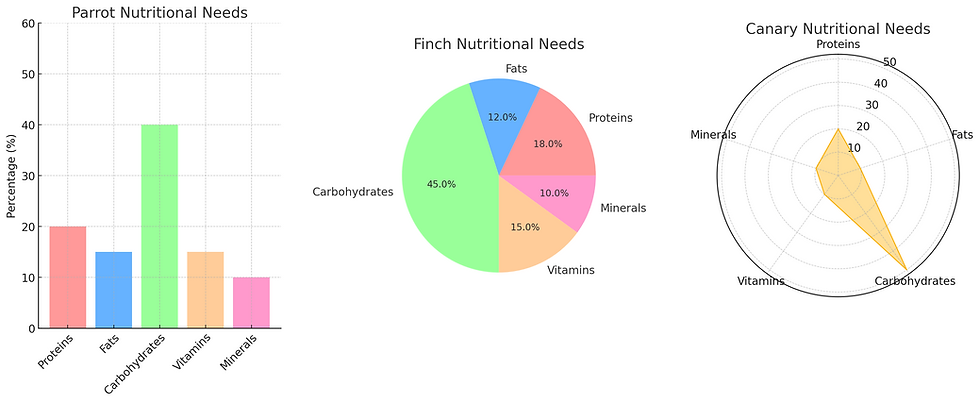
Pet birds need specific nutrients to stay healthy and happy. Let's explore what they need and how to provide it through the right seed mixes.
What are the essential nutrients required for pet birds?
Birds need a variety of nutrients just like we do. Here are the key ones:
Vitamins - Help with growth and overall health.
Minerals - Important for bones and feathers.
Proteins - Build muscles and repair tissues.
Fats - Give energy and keep feathers shiny.
Carbohydrates - Provide energy for daily activities.
For more details, check out importance of a balanced diet for birds.
How do different seed mixes fulfill the nutritional needs of pet birds?
Different seed mixes offer a variety of nutrients. Here's a simple table to help you understand:
Seed Type | Key Nutrients |
Sunflower Seeds | Fats, Proteins |
Millet | Carbohydrates, Vitamins |
Canary Seeds | Proteins, Carbohydrates |
Flax Seeds | Omega-3 Fats, Fiber |
Learn more about the benefits of different diets for your pet bird.
What are the consequences of nutrient deficiencies in pet birds?
When pet birds don't get enough nutrients, they can face several health problems:
Health issues like weak bones and poor feather condition.
Developmental problems such as stunted growth.
Weakened immune system, making them prone to illnesses.
For a deeper understanding, visit our article on common bird diseases.
How can supplements be used in addition to seed mixes?
Supplements can boost your bird's diet. Here are some options:
Vitamin supplements - Ensure they get enough vitamins.
Mineral supplements - Provide essential minerals.
Dietary enhancers - Improve overall nutrition.
For more tips, read about handling and bonding with your bird.
Seed Types
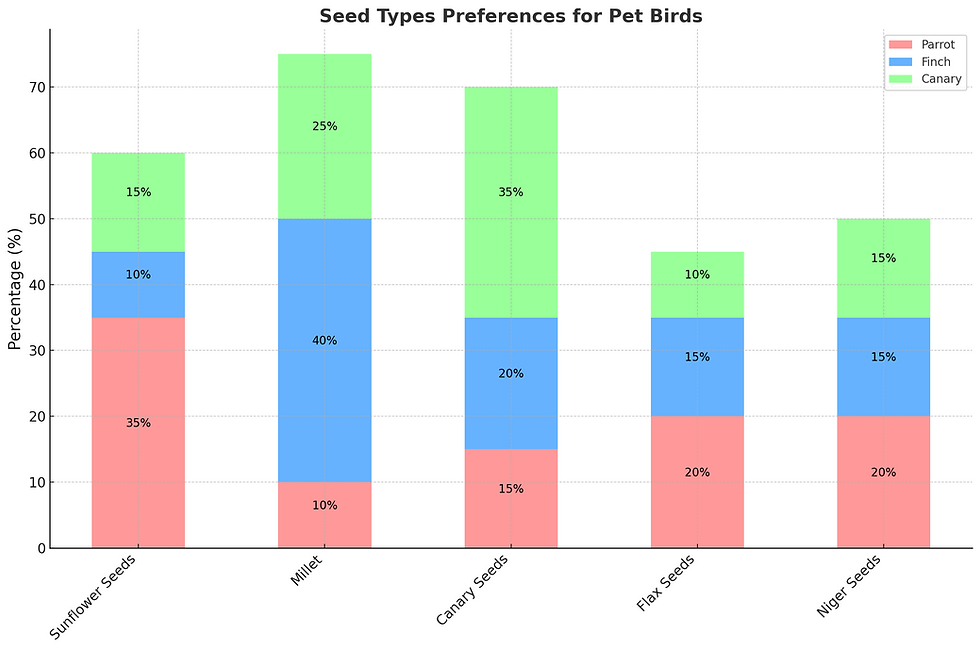
Choosing the right seed types is crucial for your bird's health. Let's dive into the different types and their benefits.
What are the most common types of seeds used in bird mixes?
Here are the most popular seeds used in bird mixes:
Sunflower Seeds - High in fat and protein.
Millet - Rich in carbohydrates and vitamins.
Canary Seeds - Good source of proteins and carbohydrates.
Flax Seeds - Packed with Omega-3 fats and fiber.
Discover more about fresh foods for birds.
How do different seed types cater to various bird species?
Different bird species have unique dietary needs. Here's a quick look:
Parrots - Prefer a mix of seeds, nuts, and fresh fruits.
Finches - Thrive on small seeds like millet and canary seeds.
Canaries - Need a diet rich in canary seeds and fresh greens.
Read more about specific bird species and their diets.
Are there any seeds that should be avoided in bird mixes?
Some seeds can be harmful to birds. Avoid these:
Apple seeds - Contain cyanide, which is toxic.
Cherry pits - Also contain cyanide.
Avocado - Contains persin, which is toxic to birds.
Learn about common behaviors to watch for in your pet bird.
How can you ensure a balanced seed mix for your pet bird?
To create a balanced seed mix, follow these tips:
Include a variety of seeds to cover all nutrient needs.
Check the proportion balance to avoid excess fats or carbs.
Analyze the nutritional content to ensure completeness.
For more guidance, see our bird care tips.
Bird Species
Different bird species have unique dietary needs. Understanding these needs helps you choose the best seed mixes for your pet bird.
How do the dietary needs vary among different bird species?
Each bird species has specific dietary requirements. Here’s a quick guide:
Parrots - Enjoy a mix of seeds, nuts, and fresh fruits.
Finches - Thrive on small seeds like millet and canary seeds.
Canaries - Need a diet rich in canary seeds and fresh greens.
Explore more about different bird species and their diets.
What are the best seed mixes for parrots?
Parrots need a varied diet to stay healthy. Here are some tips:
Include sunflower seeds for fats and proteins.
Add nuts for extra nutrients.
Mix in fresh fruits for vitamins.
Learn more about parrot care and diet tips.
How do you choose seed mixes for finches?
Finches have small beaks, so they need tiny seeds. Here’s what to include:
Millet - A favorite among finches.
Canary seeds - Provide essential nutrients.
Niger seeds - Rich in fats and oils.
Check out more on finch care and feeding.
Are there specific seed mixes for canaries?
Canaries need a balanced diet to sing and stay healthy. Here’s a guide:
Canary seeds - Main part of their diet.
Millet - Adds variety.
Fresh greens - For vitamins and minerals.
Learn more about canary care and feeding tips.
Seed Quality
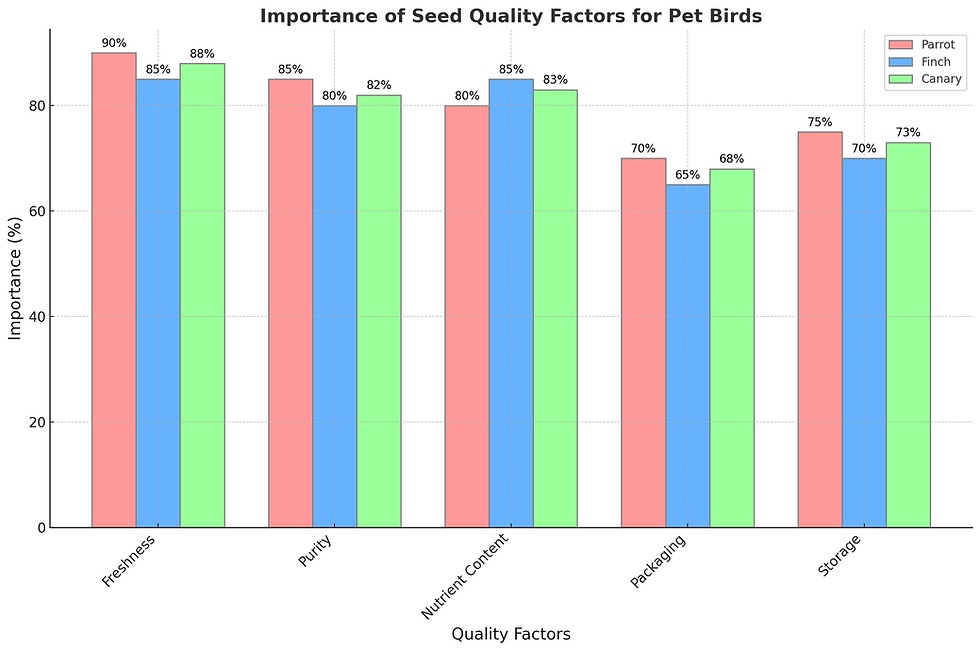
Choosing high-quality seeds is essential for your bird’s health. Let's explore what makes seeds high quality and how to identify them.
What factors determine the quality of bird seeds?
Several factors affect seed quality. Here are the key ones:
Freshness - Fresh seeds are more nutritious.
Purity - Seeds should be free from contaminants.
Nutrient content - Ensure they are rich in essential nutrients.
Read more about high-quality bird food.
How can you identify high-quality bird seeds?
Look for these signs to choose the best seeds:
Check for clean packaging.
Look for bright colors and fresh smell.
Ensure there are no dust or debris.
Find out more about selecting quality seeds.
What are the risks of using low-quality seeds?
Low-quality seeds can harm your bird. Here are some risks:
Contamination - Can lead to illness.
Nutrient deficiency - Poor quality seeds lack nutrients.
Health issues - Weak immune system and poor growth.
Learn more about bird health and how to protect it.
How should bird seeds be stored to maintain their quality?
Proper storage keeps seeds fresh and nutritious. Follow these tips:
Store in a cool, dry place.
Use airtight containers to prevent moisture.
Keep away from direct sunlight.
Read more about bird care and maintenance tips.
Commercial Seed Mixes

Choosing the right commercial seed mixes can make feeding your bird easy and nutritious. Let's explore their advantages and how to pick the best ones.
What are the advantages of commercial seed mixes?
Commercial seed mixes offer several benefits:
Convenience - Ready to use, saving time.
Nutritional balance - Formulated to meet birds' dietary needs.
Brand variety - Plenty of options to choose from.
Learn more about the benefits of ready-made options for your pet bird.
How do different brands of seed mixes compare?
Comparing brands helps you find the best seed mix for your bird. Here's what to look for:
Check product reviews for feedback.
Compare ingredient lists to ensure quality.
Look at nutritional information to meet your bird's needs.
Read our guide on choosing the right products for your bird.
Are there any commercial seed mixes specifically designed for certain bird species?
Yes, some commercial seed mixes are made for specific bird species:
Parrot mixes - Include nuts and fruits.
Canary mixes - Focus on canary seeds and greens.
Finch mixes - Contain small seeds like millet.
Explore more about species-specific diets for your bird.
What should you look for on the label of a commercial seed mix?
Reading the label helps you choose a healthy seed mix:
Check the ingredient list for variety.
Look for nutritional information to ensure balance.
Avoid harmful additives and preservatives.
Learn more about understanding product labels.
Homemade Seed Mixes
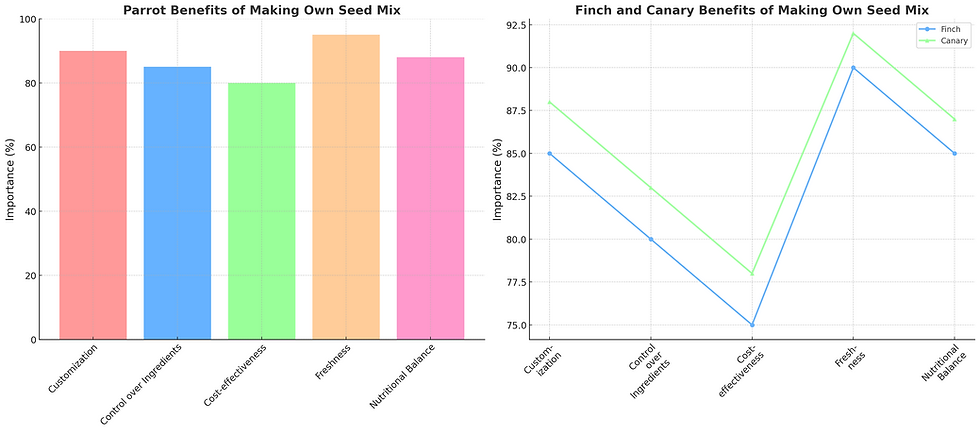
Making your own homemade seed mixes can be fun and rewarding. Let's see how you can create a nutritious mix for your bird.
How can you create a homemade seed mix for your pet bird?
Creating a homemade seed mix is simple. Follow these steps:
Select a variety of seeds like millet, sunflower, and flax.
Mix in some grains like oats and barley.
Add nuts and dried fruits for extra nutrients.
Discover more about healthy food options for birds.
What are the benefits of making your own seed mix?
Homemade seed mixes offer many advantages:
Customization - Tailor the mix to your bird's needs.
Control over ingredients - Ensure high quality.
Cost-effectiveness - Save money by buying in bulk.
Read about the benefits of personalized diets for birds.
What ingredients are commonly used in homemade seed mixes?
Include these common ingredients in your homemade seed mix:
Millet - A staple for many birds.
Sunflower seeds - Rich in fats and proteins.
Flax seeds - Packed with Omega-3 fats.
Dried fruits - Provide vitamins and minerals.
Find more tips on balanced diets.
How can you ensure that a homemade seed mix meets your bird's nutritional needs?
To make sure your homemade seed mix is nutritious, follow these tips:
Include a variety of seeds and grains.
Add vitamin and mineral supplements if needed.
Regularly rotate ingredients to keep the diet interesting.
Learn more about providing balanced nutrition for your bird.
Seasonal Variations

Birds' dietary needs can change with the seasons. It's important to adjust their seed mixes accordingly to keep them healthy year-round.
How do the dietary needs of birds change with the seasons?
Birds need different nutrients at different times of the year:
Winter - Higher fat content to stay warm.
Spring - Extra vitamins for breeding season.
Summer - More hydration and fresh fruits.
Fall - Nutrient-rich seeds to prepare for winter.
Learn more about seasonal diets for your pet bird.
What are the best seed mixes for birds during the breeding season?
During breeding season, birds need extra nutrients to support egg production and chick development:
High-protein seeds - Like sunflower and canary seeds.
Calcium supplements - For strong eggshells.
Fresh greens - To provide essential vitamins.
Discover more about breeding basics and nutrition.
How do winter seed mixes differ from summer seed mixes?
Winter and summer seed mixes should cater to different needs:
Winter - Higher fat seeds like sunflower and safflower for energy.
Summer - Light seeds like millet and fresh fruits for hydration.
Read more about seasonal care for your bird.
Are there specific seeds that help birds during molting season?
During molting, birds need nutrient-rich seeds to support feather growth:
Flax seeds - High in Omega-3 fats.
Hemp seeds - Rich in proteins and fats.
Niger seeds - Provide essential oils.
Learn more about feather care and nutrition.
Seed Mix Additives

Additives in seed mixes can enhance your bird's diet. It's important to know which additives are beneficial and which to avoid.
What additives are commonly found in bird seed mixes?
Here are some common additives that can be beneficial:
Vitamins - Enhance overall health.
Minerals - Strengthen bones and feathers.
Preservatives - Keep seeds fresh longer.
Discover more about bird nutrition and health.
How do additives like vitamins and minerals benefit pet birds?
Adding vitamins and minerals to seed mixes can provide these benefits:
Stronger bones and feathers.
Improved immune system.
Better overall health and vitality.
Learn more about the benefits of additives in bird food.
Are there any harmful additives to watch out for in seed mixes?
Some additives can be harmful to birds. Avoid these:
Artificial colors - Can cause health issues.
Sugar - Leads to obesity and other problems.
Preservatives - Some can be toxic if overused.
Find out more about bird safety and health tips.
How can probiotics in seed mixes improve bird health?
Probiotics are great for your bird’s digestive health. Here’s why:
Improves digestion and nutrient absorption.
Boosts immune system.
Maintains a healthy gut flora.
Learn more about the benefits of probiotics in bird diets.
Organic vs. Non-Organic Seeds

Choosing between organic and non-organic seeds is important for your bird’s health. Let’s explore the benefits of organic seeds and how to make the best choice.
What are the benefits of using organic seeds for pet birds?
Organic seeds offer several health advantages:
Free from pesticides - Safer for your bird.
More nutrients - Better nutritional value.
Environmentally friendly - Better for the planet.
Learn more about the benefits of organic foods for your bird.
How do non-organic seeds differ from organic seeds?
Non-organic seeds are different in these ways:
Use of pesticides - Can leave harmful residues.
Lower nutrient content - Less beneficial.
Less environmentally friendly - Can harm the environment.
Find out more about seed choices for your bird.
Are there any risks associated with non-organic seeds?
Using non-organic seeds can pose several risks:
Exposure to pesticides - Can harm your bird.
Health issues - Long-term exposure may cause problems.
Environmental impact - Not sustainable.
Learn more about the dangers of non-organic seeds.
How can you verify if the seeds are truly organic?
Ensure your seeds are truly organic by checking:
Certification labels - Look for organic certifications.
Trusted brands - Buy from reputable sources.
Packaging information - Read labels carefully.
Find tips on choosing organic products for your bird.
Special Diets

Sometimes, birds need special diets to stay healthy. Let’s look at how to manage special dietary needs.
What are special diet considerations for birds with health issues?
For birds with health issues, consider these dietary adjustments:
Low-fat seeds - For overweight birds.
High-protein seeds - For birds with muscle loss.
Vitamin supplements - For deficiencies.
Learn more about special diets for birds.
How can seed mixes be tailored for older birds?
Older birds need special nutrition to stay healthy:
Soft seeds - Easier to eat.
High-calcium seeds - For bone health.
Vitamin supplements - To boost immunity.
Read more about caring for older birds.
What seed mixes are recommended for birds with allergies?
For birds with allergies, choose allergen-free seed mixes:
Grain-free mixes - To avoid common allergens.
Organic seeds - Fewer chemicals.
Single-ingredient seeds - Easier to identify allergens.
Learn about managing allergies in birds.
How do you manage a low-fat diet for overweight birds?
To help overweight birds, use a low-fat diet:
Low-fat seeds - Like millet and canary seeds.
Fresh fruits and vegetables - For variety and nutrients.
Portion control - Avoid overfeeding.
Find tips on healthy diets for birds.
Supplementary Foods
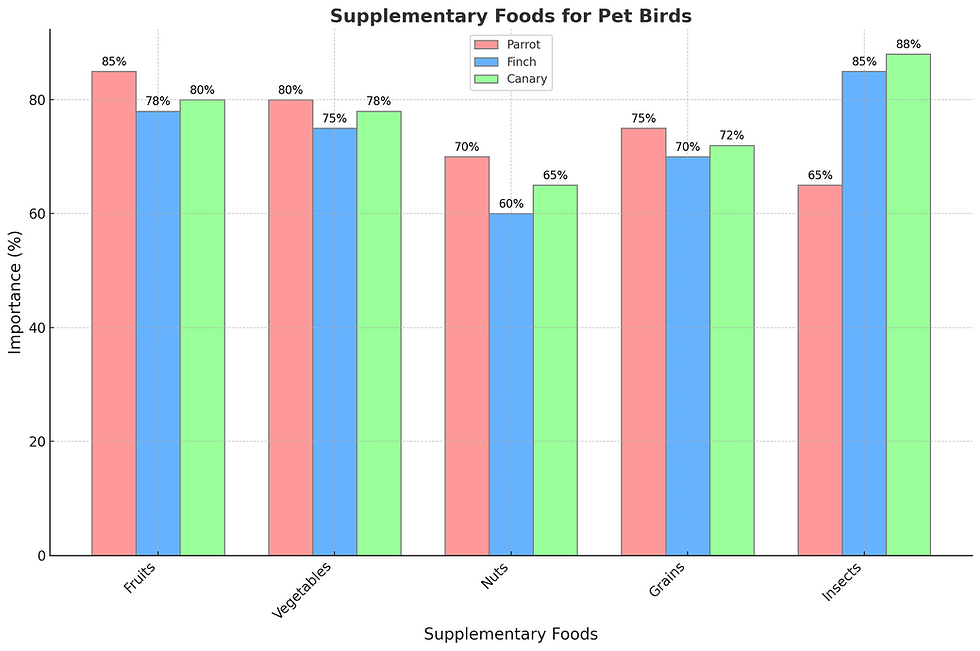
Adding supplementary foods to your bird's diet can enhance their health and happiness. Let's explore some great options.
What supplementary foods can be offered along with seed mixes?
Supplementary foods provide extra nutrition for your bird. Here are some good choices:
Fruits - Apples, bananas, and berries.
Vegetables - Carrots, spinach, and broccoli.
Protein sources - Boiled eggs and cooked beans.
Discover more about healthy supplementary foods for your bird.
How do fruits and vegetables complement seed mixes?
Fruits and vegetables add vital vitamins and minerals to your bird's diet:
Fruits - Provide natural sugars and vitamins.
Vegetables - Offer fiber and essential nutrients.
Learn more about the benefits of fruits and vegetables for birds.
Are there any supplementary foods that should be avoided?
Some foods can be harmful to birds. Avoid these supplementary foods:
Chocolate - Toxic to birds.
Avocado - Contains persin, which is harmful.
Caffeine - Can cause heart problems.
Find out more about unsafe foods for birds.
How often should supplementary foods be given to pet birds?
Offer supplementary foods in moderation:
Fruits - A few pieces daily.
Vegetables - Small portions every other day.
Proteins - Once or twice a week.
Learn about daily care routines for your bird.
Feeding Habits
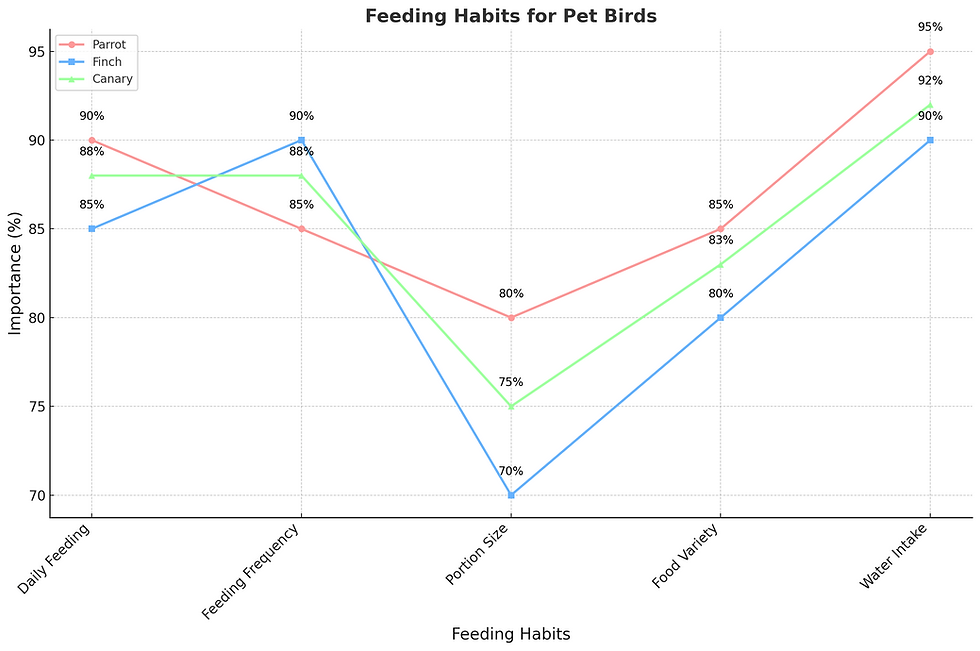
Establishing healthy feeding habits is key to your bird’s well-being. Let’s explore how to create and maintain these habits.
How do you establish healthy feeding habits in pet birds?
Healthy feeding habits are essential. Here’s how to start:
Create a consistent feeding schedule.
Provide a variety of nutritious foods.
Monitor your bird’s eating behavior.
Read more about establishing routines for your bird.
What are the signs of overfeeding or underfeeding?
Look for these signs to ensure proper feeding:
Overfeeding - Weight gain, leftover food.
Underfeeding - Weight loss, constant hunger.
Learn more about healthy feeding habits for birds.
How can you encourage picky eaters to try new seed mixes?
Help picky eaters enjoy new seed mixes by:
Mixing new seeds with familiar ones.
Offering small amounts first.
Being patient and persistent.
Find more tips on feeding picky eaters.
What role does feeding environment play in a bird's diet?
A good feeding environment helps birds eat better:
Keep the cage clean and food fresh.
Provide a quiet and comfortable area.
Use proper feeding dishes.
Learn more about creating a good environment for your bird.
Conclusion
Choosing the right seed mix for your pet bird is crucial for their health and happiness. This guide has shown that understanding the nutritional needs of different bird species and selecting high-quality seeds can make a significant difference.
Here are the key points to remember:
Nutritional Needs - Ensure a balanced diet with essential nutrients.
Seed Types - Select the right seeds for your bird’s specific needs.
Seed Quality - Choose high-quality seeds to avoid health risks.
Commercial and Homemade Seed Mixes - Both options can be beneficial when chosen wisely.
Seasonal Variations - Adjust diets to meet seasonal requirements.
Organic Seeds - Opt for organic to avoid harmful chemicals.
Special Diets - Cater to specific health needs and conditions.
Supplementary Foods - Enhance nutrition with fruits, vegetables, and proteins.
Feeding Habits - Establish healthy routines and monitor feeding behaviors.
By following these guidelines, you can provide a balanced and nutritious diet for your pet bird, ensuring they stay healthy and vibrant. A happy bird is a healthy bird, and the right seed mix plays a big role in their well-being.
Take the time to understand your bird’s dietary needs and choose the best seed mix available. Your effort will ensure that your feathered friend enjoys a long, healthy, and joyful life!



Comments